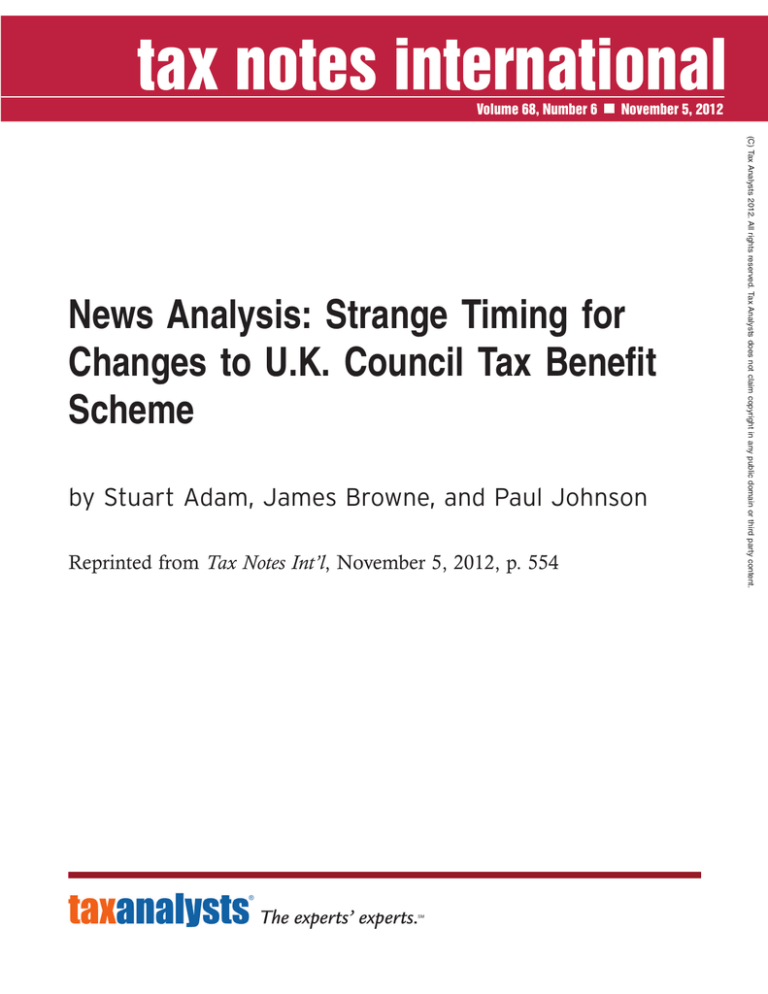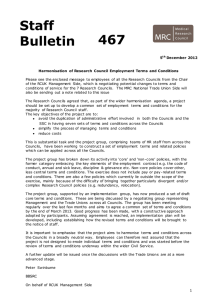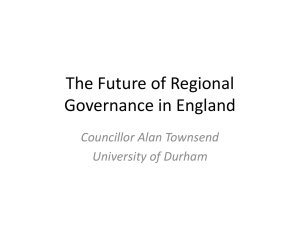
Volume 68, Number 6
November 5, 2012
by Stuart Adam, James Browne, and Paul Johnson
Reprinted from Tax Notes Int’l, November 5, 2012, p. 554
(C) Tax Analysts 2012. All rights reserved. Tax Analysts does not claim copyright in any public domain or third party content.
News Analysis: Strange Timing for
Changes to U.K. Council Tax Benefit
Scheme
Reprinted from Tax Notes Int’l, November 5, 2012, p. 554
NEWS ANALYSIS
Strange Timing for Changes to U.K.
Council Tax Benefit Scheme
In a recent ministerial statement, the U.K. government announced a significant change to its plan to localize the council tax benefit (CTB) starting in April
2013. Why has such a significant change been announced to a policy two years after it was first announced, less than six months before councils will have
to implement it, and after many have already consulted
on the structure of proposed schemes?
The CTB provides support to 5.9 million lowincome families, more than any other means-tested
benefit or tax credit in the U.K. The government is
now seeking to abolish the CTB across Britain and to
give grants to local authorities in England, as well as
the Scottish and Welsh governments, to design their
own CTB systems. Further, the government plans to
cut by 10 percent the funding it provides for council
tax support. This would save around £500 million a
year, officials said.
We have analyzed the effects of these proposals in
some detail and have concluded that localization
would create considerable complexity just when the
universal credit is being rolled out with the intention of
simplifying things. (For an explanation of the universal
credit, see Doc 2012-12804 or 2012 WTD 116-20.)
The change could also undermine many of the improvements to work incentives that the universal credit
is intended to deliver. For councils to save the full 10
percent by which funding would be cut, either the
means test would have to be so severe that some
people would be worse off after a pay increase, or
councils would have to collect some local tax from the
very poorest for the first time since the poll tax. Many
councils are already in consultations over schemes that
would have those sorts of consequences.
Just recently — two years after the policy was originally announced, less than four months before local
authorities have to finalize their new schemes, and only
a week before the third reading of the bill in the House
of Lords — new proposals were forthcoming.
TAX NOTES INTERNATIONAL
A £100 million package was recently announced in
a ministerial statement. That money, which amounts to
20 percent of the total planned savings, would be available to councils whose schemes meet a particular set of
criteria that the government considers ‘‘best practice.’’
It would, apparently, be available for one year only.
Councils would be eligible for the money if:
• nobody who is currently on full CTB ends up paying more than 8.5 percent of their council tax liability (in practice, because of the cost of collecting such small amounts from very-low-income
households that are not used to paying council
tax, councils may prefer to give a full rebate to
such households);
• the rate at which the benefit is withdrawn as income rises is no higher than 25 percent (as compared with 20 percent currently); and
• there are no ‘‘cliff edges’’ (sudden drops) in the
system.
Even with an extra £100 million to soften the blow,
it is hard to see how most councils could design
schemes that meet these criteria with the reduced funding intended for council tax support. Therefore, it appears the government is aiming to pay councils not
only to design schemes that the government likes, but
to design schemes that don’t cut support as much as
the councils’ funding is being cut, leaving them to
make up the shortfall from elsewhere in their budgets.
It is hard to square this development with a policy
whose stated goal is to devolve responsibility. Why the
additional money should be appropriate in the first
year of the policy and not later is unclear. But perhaps
of most concern is what this says about the policymaking process. The potential downsides that the government seems to be trying to ameliorate — losses for the
poorest households and the weakening of work incentives — have been obvious to many observers for a
long time.
Yet this announcement has come late in the process.
The bill has already completed its passage through the
House of Commons, and scrutiny by a committee of
the House of Lords has concluded. The announcement
came on the eve of a key House of Lords debate on
amendments to the bill and just a week before the third
NOVEMBER 5, 2012 • 1
(C) Tax Analysts 2012. All rights reserved. Tax Analysts does not claim copyright in any public domain or third party content.
COUNTRY
DIGEST
COUNTRY DIGEST
Reprinted from Tax Notes Int’l, November 5, 2012, p. 554
2 • NOVEMBER 5, 2012
fully considered reform — as this one appears to be —
are considerable.
◆
♦ Stuart Adam, James Browne, and Paul Johnson,
Institute for Fiscal Studies, London.
This was originally published as an ‘‘Observation’’ by the
Institute for Fiscal Studies (http://www.ifs.org.uk/).
TAX NOTES INTERNATIONAL
(C) Tax Analysts 2012. All rights reserved. Tax Analysts does not claim copyright in any public domain or third party content.
reading in the House of Lords. Many councils have
already commenced public consultations on draft proposals (as the bill requires them to do) but are now
being encouraged to change their proposals at the last
moment — perhaps only to revert to their original
plans when this extra funding is withdrawn a year
later.
The case for well-thought-through reform of the
welfare system is overwhelming. The dangers of less








